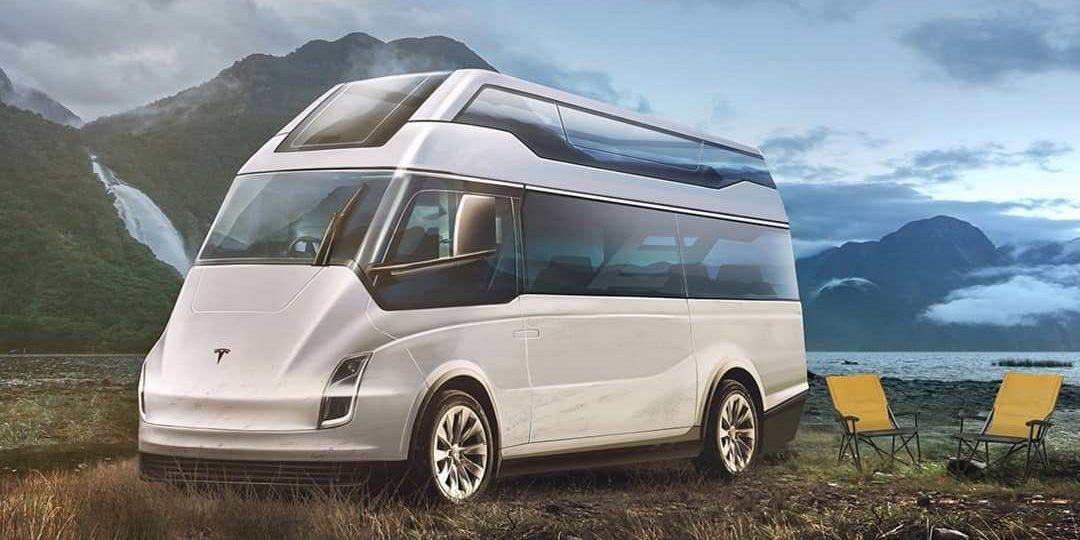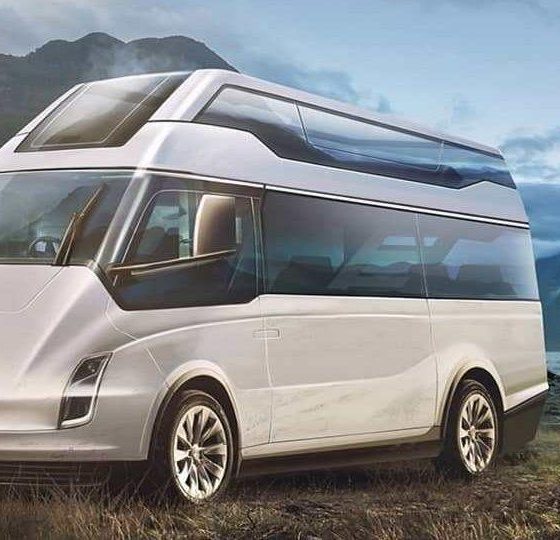Tesla CEO Elon Musk gave some details about the prospective electric van that the company could develop in the coming years. In an interview with Joe Rogan on the comedian’s podcast, the Joe Rogan Experience, Musk indicated that a van’s design would be more favorable to equip solar panels for stationary charging.
Tesla Electric Van
During Tesla’s Q4 2020 Earnings Call, TBC Capital Markets analyst Joseph Spak asked Musk about the possibility of developing an all-electric van. Vans have become a major player in the EV space since Rivian was contracted by e-commerce giant Amazon to build 100,000 electric delivery vans. The vans have recently started testing in Southern California. Ford also developed an electric version of its Transit van.
The prospect of Tesla developing an electric van was confirmed by Musk during the Earnings Call.
He said:
“I think Tesla is definitely going to make an electric van at some point.”
Tesla’s EV Van with Solar Panels
Equipping any of Tesla’s currently-offered vehicles with solar panels would raise the cost of the car exponentially while not giving enough value to drivers who would pay for the feature. The issue is, most passenger vehicles do not have the surface area, or are they driven in the correct climate to make the installation of solar panels an advantageous solution to add driving range. Some have tried this in the past with DIY projects, but it hasn’t resulted in much effectiveness to justify it as an option for Tesla.
Tesla owner ‘charges’ Model 3 with homemade solar panel trailer
However, Musk says that a van would be ideal for a solar panel system, considering its relatively flat roof and large surface area. These two issues are what make the design unfavorable for sleek, stylish sedans and SUVs that the company offers for passenger transport. A van, however, is boxy and would be effective for solar panels if they were to be outfitted onto a vehicle.
Musk said:
“Now, a van, because you have a big, flat area, that’s actually where solar could start to make a little more sense. You know, because you have a lot of area. You could also have, maybe, a roof where it is solar, and then, when it is stationary, [the roof] goes out and provides shade, and maybe triples your area or something like that. Now, you triple the area, and you have a big, flat surface, you could maybe start charging enough where you start getting like 30 miles a day.”
Rogan described Musk’s idea, indicating that the roof “going out” would look similar to an awning, which would make sense especially in the case that the van needed more surface area for the solar panels.
Of course, this idea is preliminary, as Tesla has not confirmed that it is developing an electric van for the market. However, it could be advantageous for several things, including commerce transportation and for use with the Boring Company’s several underground loops that are in development.
Musk’s full interview with Rogan is available here.

Lifestyle
Tesla Model S Plaid battles China’s 1500 hp monster Nurburgring monster, with surprising results
There is just something about Tesla’s tuning and refinement that makes raw specs seem not as game-changing.
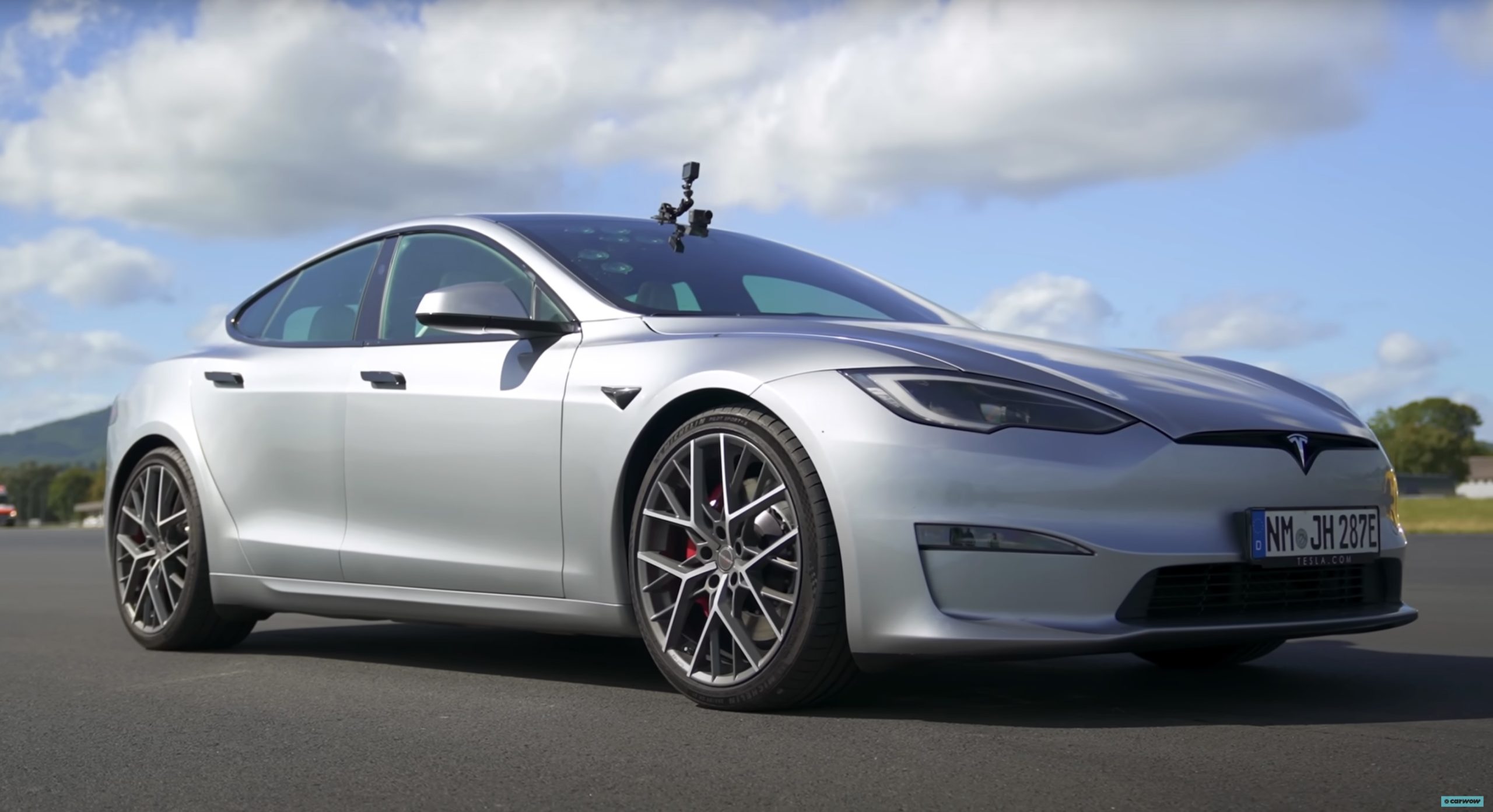
The Tesla Model S Plaid has been around for some time. Today, it is no longer the world’s quickest four-door electric sedan, nor is it the most powerful. As per a recent video from motoring YouTube channel Carwow, however, it seems like the Model S Plaid is still more than a match for some of its newer and more powerful rivals.
The monster from China
The Xiaomi SU7 Ultra is nothing short of a monster. Just like the Model S Plaid, it features three motors. It also has 1,548 hp and 1,770 Nm of torque. It’s All Wheel Drive and weighs a hefty 2,360 kg. The vehicle, which costs just about the equivalent of £55,000, has been recorded setting an insane 7:04.957 at the Nurburgring, surpassing the previous record held by the Porsche Taycan Turbo GT.
For all intents and purposes, the Model S Plaid looked outgunned in Carwow’s test. The Model S Plaid is no slouch with its three motors that produce 1,020 hp and 1,420 Nm of torque. It’s also a bit lighter at 2,190 kg despite its larger size. However, as the Carwow host pointed out, the Model S Plaid holds a 7:25.231 record in the Nurburgring. Compared to the Xiaomi SU7 Ultra’s record, the Model S Plaid’s lap time is notably slower.
Real-world tests
As could be seen in Carwow’s drag races, however, Tesla’s tech wizardry with the Model S Plaid is still hard to beat. The two vehicles competed in nine races, and the older Model S Plaid actually beat its newer, more powerful counterpart from China several times. At one point in the race, the Xiaomi SU7 Ultra hit its power limit due to its battery’s temperature, but the Model S Plaid was still going strong.
The Model S Plaid was first teased five years ago, in September 2020 during Tesla’s Battery Day. Since then, cars like the Lucid Air Sapphire and the Xiaomi SU7 Ultra have been released, surpassing its specs. But just like the Model Y ended up being the better all-rounder compared to the BYD Sealion 7 and the MG IM6, there is just something about Tesla’s tuning and refinement that makes raw specs seem not as game-changing.
Check out Carwow’s Model S Plaid vs Xiaomi SU7 drag race video below.
Lifestyle
500-mile test proves why Tesla Model Y still humiliates rivals in Europe
On paper, the BYD Sealion 7 and MG IM6 promised standout capabilities against the Model Y.
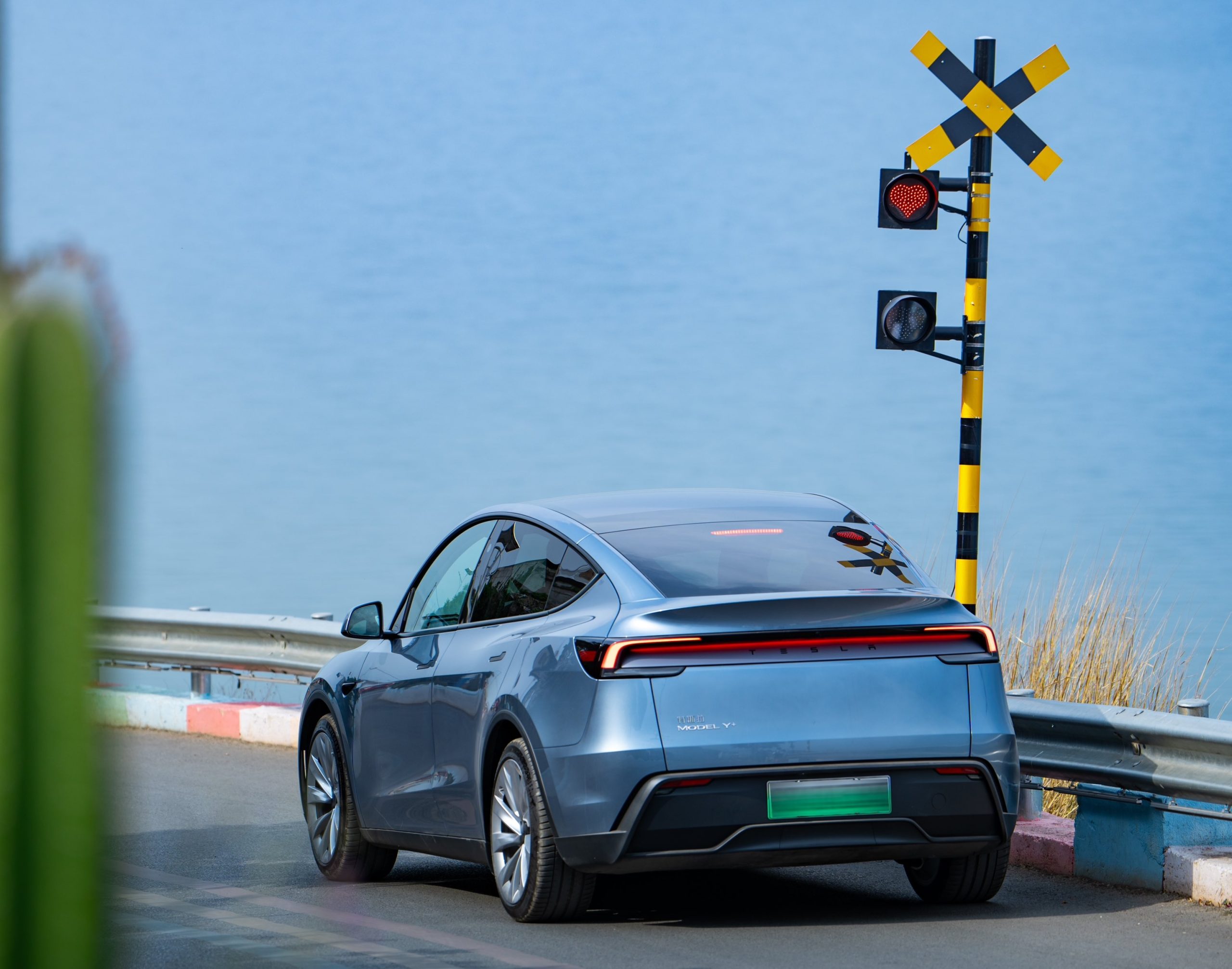
BYD is seeing a lot of momentum in Europe, so much so that mainstream media has taken every opportunity to argue that the Chinese automaker has beaten Tesla in the region. But while BYD sales this year in Europe are rising and Tesla’s registrations remain challenged, the raw capabilities of vehicles like the Model Y are difficult to deny.
This was highlighted in a 500-mile challenge by What Car? magazine, which showed that the new Tesla Model Y is more efficient, cheaper to run, and more reliable than rivals like the BYD Sealion 7, and even the nearly 400 KW-charging MG IM6.
Range and charging promises
On paper, the BYD Sealion 7 and MG IM6 promised standout capabilities against the Model Y. The Sealion 7 had more estimated range and the IM6 promised significantly faster charging. When faced with real-world conditions, however, it was still the Model Y that proved superior.
During the 500-mile test, the BYD nearly failed to reach a charging stop, arriving with less range than its display projected, as noted in a CarUp report. MG fared better, but its charging speeds never reached its promised nearly-400 kW charging speed. Tesla’s Model Y, by comparison, managed energy calculations precisely and arrived at each stop without issue.
Tesla leads in areas that matter
Charging times from 25% to 80% showed that the MG was the fastest at 17 minutes, while Tesla and BYD were close at 28 and 29 minutes, respectively. Overall efficiency and cost told a different story, however. The Model Y consumed 19.4 kWh per 100 km, compared to 22.2 for MG and 23.9 for BYD. Over the full trip, Tesla’s charging costs totaled just £82 thanks to its supercharger network, far below BYD’s £130 and MG’s £119.
What Car? Magazine’s testers concluded that despite BYD’s rapid sales growth and the MG IM6’s seriously impressive charging speeds, Tesla remains the more compelling real-world choice. The Model Y just offers stability, efficiency, and a proven charging infrastructure through its Supercharging network. And as per the magazine’s hosts, the Model Y is even the cheapest car to own among the three that were tested.
Watch What Car? Magazine’s 500-mile test in the video below.
Lifestyle
Tesla Cybertruck slapped with world’s least intimidating ticket, and it’s pure cringe
One cannot help but cringe and feel second-hand embarrassment at the idea of a person just driving around with a stack of these babies.
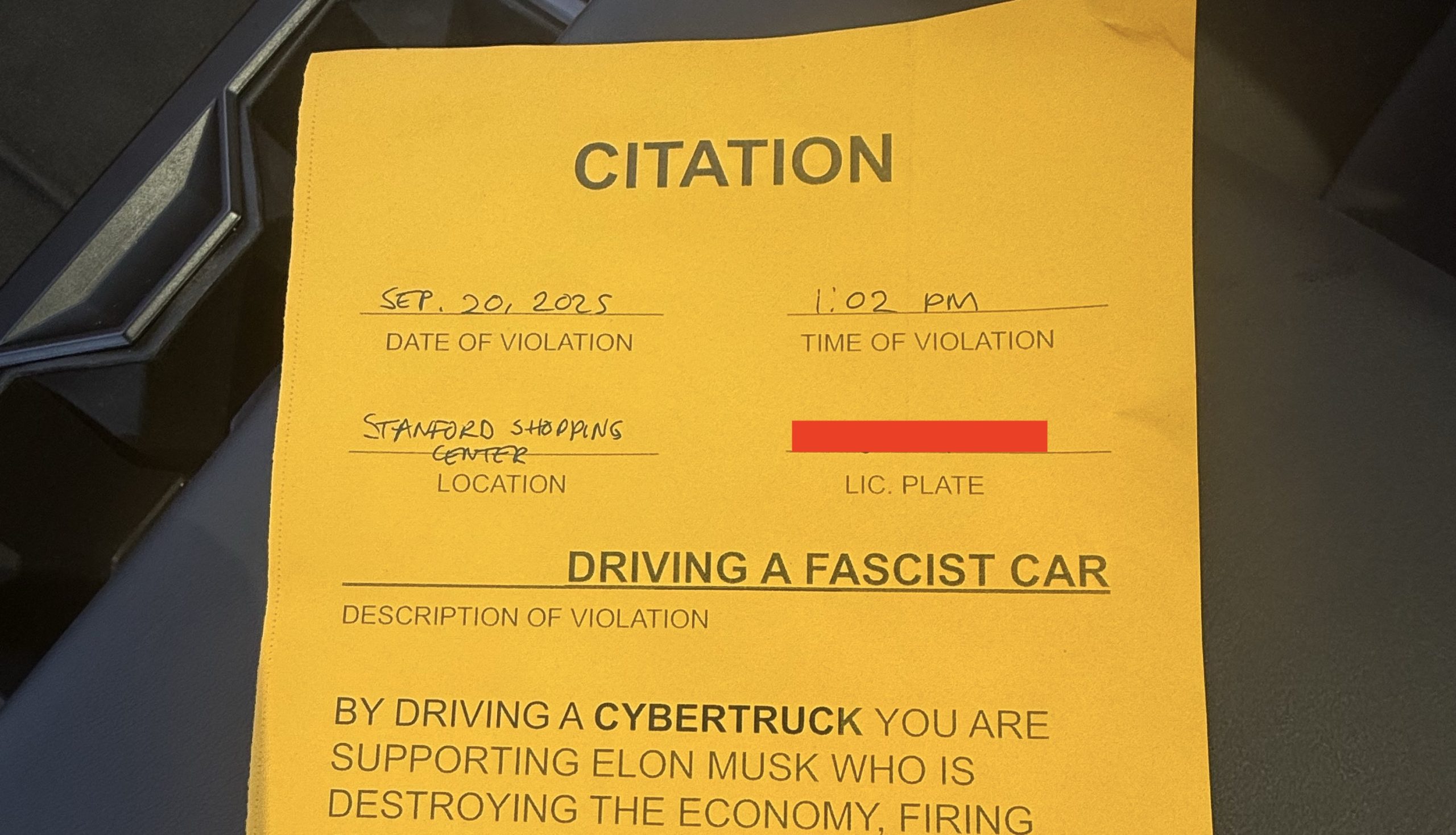
A Cybertruck parked at Stanford Shopping Center in California was recently hit with what might be the most try-hard piece of paper ever slipped under a wiper blade: a “fake citation” accusing the driver of supporting a “fascist car.”
The note, shared on X by Tesla staff program manager Ryan Torres, quickly made the rounds on X, where it quickly gained attention as an example of how not to protest.
The world’s least intimidating ticket
According to the citation, the supposed “violation” was “driving a fascist car.” The remedial action? Take the bus, call an Uber, or ride a bike. The note also dubbed Elon Musk a “chainsaw-wielding Nazi billionaire.” Now, protests against Tesla and Elon Musk have become commonplace this year, but one cannot help but cringe and feel second-hand embarrassment at the idea of a person just driving around with a stack of fake anti-Tesla/Musk citations.
Torres pointed out the irony himself in his post on X. Tesla currently employs over 140,000 Americans, and SpaceX has put the U.S. firmly back at the top of space technology. As Torres put it, maybe the person behind the world’s least intimidating ticket should “read a book on innovation before vandalizing” other people’s property.
Peak performative clownery
Not to mention that the fake ticket’s logic collapses under its own weight. EVs like the Cybertruck are literally designed to reduce emissions, not “destroy the economy.” If anything, Tesla has bolstered the United States’ economy by fueling jobs in engineering, manufacturing, and clean energy. It’s not the first time a Tesla has been the target of vandalism or politically charged notes, but this one stands out for sheer cringe value.
Torres summed it up neatly: “Peak clownery.” On that point, at least, the citation earns full marks. In a way, though, perhaps cringe fake tickets are not as bad as the literal firebombs that were being thrown at Tesla stores and cars earlier this year because some critics were gleefully misinformed about Elon Musk.
